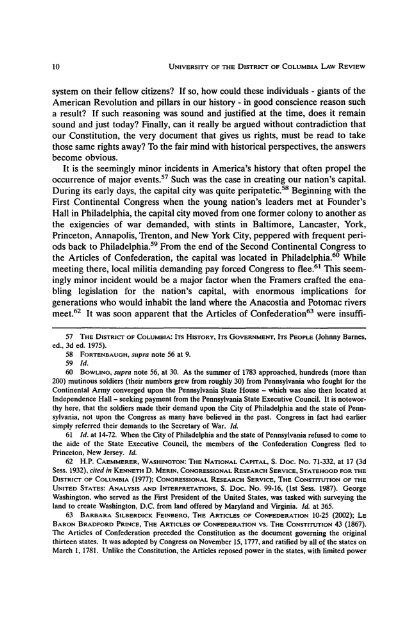Download - UDC Law Review
Download - UDC Law Review
Download - UDC Law Review
You also want an ePaper? Increase the reach of your titles
YUMPU automatically turns print PDFs into web optimized ePapers that Google loves.
10 UNIVERSITY OF THE DISTRICT OF COLUMBIA LAW REVIEWsystem on their fellow citizens? If so, how could these individuals - giants of theAmerican Revolution and pillars in our history - in good conscience reason sucha result? If such reasoning was sound and justified at the time, does it remainsound and just today? Finally, can it really be argued without contradiction thatour Constitution, the very document that gives us rights, must be read to takethose same rights away? To the fair mind with historical perspectives, the answersbecome obvious.It is the seemingly minor incidents in America's history that often propel theoccurrence of major events. 57 Such was the case in creating our nation's capital.During its early days, the capital city was quite peripatetic. 58 Beginning with theFirst Continental Congress when the young nation's leaders met at Founder'sHall in Philadelphia, the capital city moved from one former colony to another asthe exigencies of war demanded, with stints in Baltimore, Lancaster, York,Princeton, Annapolis, Trenton, and New York City, peppered with frequent periodsback to Philadelphia. 59 From the end of the Second Continental Congress tothe Articles of Confederation, the capital was located in Philadelphia. 60 Whilemeeting there, local militia demanding pay forced Congress to flee. 61 This seeminglyminor incident would be a major factor when the Framers crafted the enablinglegislation for the nation's capital, with enormous implications forgenerations who would inhabit the land where the Anacostia and Potomac riversmeet. 62 It was soon apparent that the Articles of Confederation 63 were insuffi-57 THE DISTRIcr OF COLUMBIA: ITs HISTORY, ITS GOVERNMENT, ITS PEOPLE (Johnny Barnes,ed., 3d ed. 1975).58 FORTENBAUGH, supra note 56 at 9.59 [d.60 BOWLING, supra note 56, at 30. As the summer of 1783 approached, hundreds (more than200) mutinous soldiers (their numbers grew from roughly 30) from Pennsylvania who fought for theContinental Army converged upon the Pennsylvania State House - which was also then located atIndependence Hall - seeking payment from the Pennsylvania State Executive Council. It is noteworthyhere, that the soldiers made their demand upon the City of Philadelphia and the state of Pennsylvania,not upon the Congress as many have believed in the past. Congress in fact had earliersimply referred their demands to the Secretary of War. [d.61 [d. at 14-72. When the City of Philadelphia and the state of Pennsylvania refused to come tothe aide of the State Executive Council, the members of the Confederation Congress fled toPrinceton, New Jersey. [d.62 H.P. CAEMMERER, WASHINGTON: THE NATIONAL CAPITAL, S. Doc. No. 71-332, at 17 (3dSess. 1932), cited in KENNETH D. MERIN, CONGRESSIONAL RESEARCH SERVICE, STATEHOOD FOR THEDISTRlcr OF COLUMBIA (1977); CONGRESSIONAL RESEARCH SERVICE, THE CONSTITUTION OF THEUNITED STATES: ANALYSIS AND INTERPRETATIONS, S. Doc. No. 99-16, (1st Sess. 1987). GeorgeWashington, who served as the First President of the United States, was tasked with surveying theland to create Washington, D.C. from land offered by Maryland and Virginia. [d. at 365.63 BARBARA SILBERDICK FEINBERG, THE ARTICLES OF CONFEDERATION 10-25 (2002); LEBARON BRADFORD PRINCE, THE ARTICLES OF CONFEDERATION vs. THE CONSTITUTION 43 (1867).The Articles of Confederation preceded the Constitution as the document governing the originalthirteen states. It was adopted by Congress on November 15, 1777, and ratified by all of the states onMarch 1, 1781. Unlike the Constitution, the Articles reposed power in the states, with limited power














